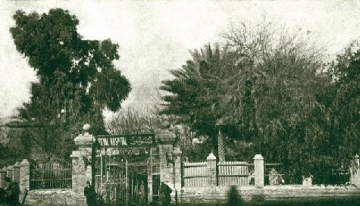The views expressed in our content reflect individual perspectives and do not represent the authoritative views of the Baha'i Faith.
This time each year Baha’is celebrate the 12-day period known as Ridvan, or Paradise—the time when Baha’u’llah declared his mission as the founder of the Baha’i Faith.
Ridvan (pronounced rez-wan) marks the holiest and happiest festival of the entire Baha’i year. These twelve Baha’i holy days, which celebrate the beginning of the Baha’i Faith in 1863, also recognize a period of great turmoil in Baha’i history, signify the transformation of suffering and oppression into joy, and serve as a symbol of a new spiritual springtime.
On three of the twelve days of Ridvan—the first, ninth and twelfth day—Baha’is take time off from work to celebrate the special significance of Baha’u’llah’s declaration. Baha’i communities everywhere observe those three special holidays by joyously coming together, taking part in gatherings, observances, service projects, parties and picnics. Music and laughter abound. On these happy occasions, usually characterized by reflection, prayer and reading from the Baha’i writings, devotion to a noble cause dedicated to the service of humanity brings great and lasting happiness.
What Does the Ninth Day of Ridvan Mean?
On the Ninth Day of Ridvan, Baha’is and their friends commemorate a profoundly symbolic event in Baha’i history.
Baha’u’llah, previously exiled to Baghdad by the Shah of a hostile Persian government, was once again officially banished from Baghdad to Constantinople (now known as Istanbul, Turkey), the capitol of the Ottoman Empire, in 1863. Both governments and clergy had opposed and feared the rapid spread of Baha’u’llah’s teachings and those of his predecessor The Bab, and the Persian authorities reacted by unleashing a violent genocidal persecution campaign of imprisonment, torture and execution against the followers of this new progressive Faith:
The Bab was martyred in Tabriz; and Baha’u’llah, exiled into Iraq in 1852, announced Himself in Baghdad. For the Persian government had decided that as long as He remained in Persia the peace of the country would be disturbed; therefore, He was exiled in the expectation that Persia would become quiet. His banishment, however, produced the opposite effect. New tumult arose, and the mention of His greatness and influence spread everywhere throughout the country. The proclamation of His manifestation and mission was made in Baghdad. He called His friends together there and spoke to them of God. – Abdu’l-Baha, The Promulgation of Universal Peace, p. 26.

Entrance to the Garden of Ridvan in Baghdad.
That horrendous persecution happened because Baha’u’llah’s teachings—peace, world unity, the essential oneness of all religions, the equality of men and women, the elimination of all prejudice—severely threatened the dogma and the dominion of the powerful clerical class who controlled the tyrannical governments in those countries. Historians have thoroughly documented the vicious treatment those cruel rulers meted out to the Baha’is, and most estimates agree that at least 20,000 innocent people were killed as a result—killed solely for their beliefs.
In the spring of 1863, with this concerted campaign of exile and extermination at its peak, Baha’u’llah prepared to leave Baghdad. He and a small number of followers moved temporarily to a verdant garden on the eastern bank of the Tigris River. This fertile wooded garden had four avenues, each lined with rose bushes, which attracted flocks of nightingales that sang loudly there every night. In the spring the flood-stage Tigris would flow past powerfully, and observers said the rushing river, the heady fragrance of the thousands of roses and the melodic songbirds “created an atmosphere of beauty and enchantment.” When the Tigris River rose, it made the Garden of Ridvan into an island, temporarily cutting it off from the mainland.
On April 29, 1863—a hundred and fifty-six years ago today—the river receded enough for Baha’u’llah’s family to cross and join him on the island.
This powerful symbol—the reunification and strength of the bond of family, and by extension the unity of the entire human family—permeates the meaning of the Ninth Day of Ridvan.
In December of 1902 Baha’u’llah’s daughter Bahiyyih Khanum was interviewed by the American attorney and writer Myron Phelps, and she recounted her family’s experience during that Ridvan period in 1863:
When the news (of Baha’u’llah’s exile) came to us, from which we inferred that my father would again be made a prisoner, we were thrown into consternation, fearing another separation. He was summoned before the magistrates …. Great numbers of his followers had assembled before our house, and these witnessed his departure with many demonstrations of grief, feeling that it was possible he might not return.
The magistrates expressed great sorrow to my father; they said that they respected and loved him, that they had not instigated the order [the exile order had come from the Sultan of Turkey], but that they were powerless to suspend or modify it, and must proceed with its execution.
This report was like a death-knell to his followers, who were still gathered about the house. The next day they so overran the house that we could not prepare for the journey … Then, as the only way in which to soothe his followers, [Baha’u’llah] took all his family to the garden. Here we pitched our tents … The tents made, as it were, a little village ….
Many of [Baha’u’llah’s] followers decided to abandon Baghdad also, and accompany him … When the caravan started (on the twelfth day of Ridvan), our company numbered about seventy-five persons. All the young men, and others who could ride, were mounted on horses. … We were accompanied by a military escort. This journey took place in 1863, about eleven years after our arrival in Baghdad. – as recounted to Myron Phelps in The Life and Teachings of Abbas Effendi, pp. 35-39.
Why Baha’is Celebrate at Ridvan
So how can such a sad and difficult occasion—banishment, exile, privation and prison for Baha’u’llah, his family and his followers—become a cause for celebration? Baha’is celebrate during Ridvan because Baha’u’llah announced his revelation, and because that revelation signals “the resurrection of all mankind:”
Arise, and proclaim unto the entire creation the tidings that He Who is the All-Merciful hath directed His steps towards the Ridvan and entered it. Guide, then, the people unto the garden of delight which God hath made the Throne of His Paradise. We have chosen thee to be our most mighty Trumpet, whose blast is to signalize the resurrection of all mankind. …
Look not upon the creatures of God except with the eye of kindliness and of mercy, for Our loving providence hath pervaded all created things, and Our grace encompassed the earth and the heavens. – Baha’u’llah, Gleanings from the Writings of Baha’u’llah, pp. 30-32.
Baha’is often observe the ninth day of Ridvan with outdoor activities like picnics, games and hikes, enjoying nature’s beauty as a reminder of Baha’u’llah’s momentous declaration on the shores of the Tigris. These Baha’i celebrations around the world echo the words of Abdu’l-Baha:
The whole world is born anew, resurrected. Gentle zephyrs are set in motion, wafting and fragrant; flowers bloom; the trees are in blossom, the air temperate and delightful; how pleasant and beautiful become the mountains, fields and meadows. Likewise, the spiritual bounty and springtime of God quicken the world of humanity with a new animus and vivification. All the virtues which have been deposited and potential in human hearts are being revealed from that Reality as flowers and blossoms from divine gardens. It is a day of joy, a time of happiness, a period of spiritual growth. – from a talk by Abdu’l-Baha to the Baha’is of Washington, D.C. on the first day of Ridvan 1912.
Along with your family and your Baha’i family, join us today to celebrate the Ninth Day of Ridvan!
















Comments
Sign in or create an account
Continue with Googleor